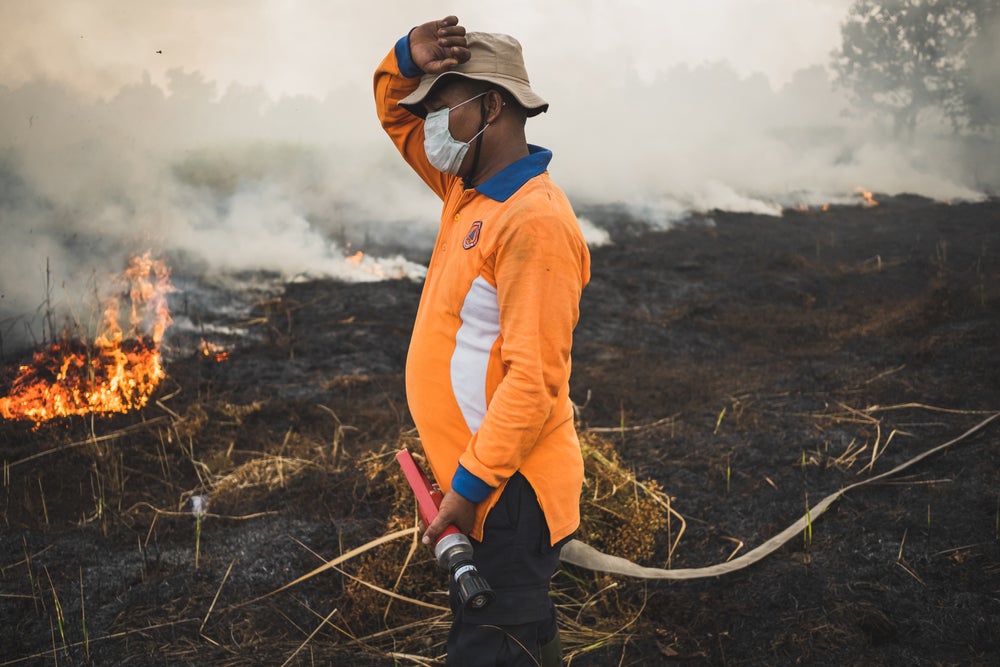Religious values and environmental protection in Indonesia: New public opinion data on transboundary haze
The 2019 haze crisis captured worldwide attention when photos of a 'red sky' in Jambi were widely circulated. The World Bank estimated that this 2019 haze episode, involving fires on an estimated 1.6 million hectares of land, caused damages and economic losses of at least USD5.2 billion, or around 0.5 per cent of Indonesia's GDP. The more severe haze of 2015, affecting 2.6 million hectares, was estimated to have cost around USD16 billion or 2 per cent of its GDP. While a serious local problem in itself, this smoke often travels across national boundaries, affecting Indonesia's immediate neighbours and beyond.

This piece follows an earlier ARIscope feature entitled "Public values and sentiments regarding trans boundary haze pollution in Singapore", which distilled the Singapore-based research findings of our Toyota Foundation project on "The Southeast Asian haze crisis: Public values as a pathway towards constructive cross-border sentiments and engagement".
In this article, we unpack our findings related to Indonesia, focusing mainly on our FGDs held in Pekanbaru, Riau in January 2020, led by a team of researchers at the Department of International Relations, Universitas Abdurrab. The FGDs were attended by 18 demographically diverse participants, spread equally across two sessions. These participants had all personally experienced both the 2015 and 2019 haze episodes in Riau.
The FGDs were designed to help us dg deeper into the results of an online survey conducted in Indonesia in July to August 2019 among 353 Indonesians which collected quantitative data on how public values, knowledge, attitudes, and behaviours relate to the haze problem. During the FGDs, key survey findings were presented to the respondents to add qualitative perspectives to the motivations and reasonings behind responses.
Individual values and the importance of religion
Despite haze-producing fires often being linked to unsustainable agribusiness practices, participants of our Indonesian FGDs showed little awareness and minimal interest in sustainability labelling on consumer products, and even less so for specifically anti-haze product labels.
A similar trend was found in FGDs conducted in Malaysia and Singapore, representing a contrast to the data we collected via online surveys across all countries, which indicate that a majority of the survey respondents check sustainability labels on products.
Most respondents in Indonesia stated that they did not examine product labels. For those who did, it was to check ingredients, expiration date, or halal (permissible according to Islamic law) status. When showed examples of sustainability labels, almost none could recognise any of them, and they believed that this was the same for most people in their communities.
Those who did recognise certain sustainability labels admitted that they did not use this knowledge in their purchasing decisions. As might be expected, price was the primary concern for consumption; a similar finding across our other FGD sessions in Malaysia and Singapore.
Interestingly, several participants were enthusiastic about the government and businesses engaging with uniquely Indonesian consumer values to increase awareness and effectiveness of sustainability labelling. One notable idea was to formally associate sustainability with halal-ness. Indeed, halal labelling has been a huge part of the Indonesian consumer culture. This year, the Indonesian government has put into place a law for mandatory halal labelling on all products.
Following the logic that something halal should not harm the environment or any of God's creations, the suggestion was to include sustainability as part of the formal requirements to obtain a halal label. This solution, rooted in religious values, was unique among the countries investigated, where Malaysian and Singaporean respondents instead highlighted the importance of education in raising consumer awareness.
In this vein of religious values, participants agreed that they did not 'blame' God for the haze crisis. On the contrary, they viewed God as the only saviour during extremely serious haze, as all human (such as governments or corporations) efforts had failed to provide solutions time and again. This belief correlated strongly with our survey findings, where almost 70 per cent of Indonesians increase their religious activities during the haze. It also correlates with the regular incidences of special prayers held for rain during the haze in Indonesia.
In contrast, respondents in Malaysia and Singapore generally did not increase their religious activities significantly during haze periods; a finding that matched Indonesian respondents' perceptions of Malaysian and Singaporeans as being more 'secular'.
An overwhelming majority of our survey respondents considered protecting the environment and conserving nature to be a guiding principle (value) in their lives. However, this result may have been influenced by the context of the survey itself, which focuses on the environment, and the possible higher levels of acquiescence among Indonesians. The FGD discussants indeed flagged this: our respondents explained that environmentalism remained low on the priority scale among Indonesians, overshadowed by other issues like the economy, education, health and infrastructure.
This has obvious parallels in current public policy, including the recent approval of the controversial Omnibus Law, favouring job creation over environmental protection. Furthermore, participants opined that even among those placing higher importance on environmental values, these values would generally remain at the cognitive level and would only rarely translate into practical efforts in their daily life.
One respondent opined that the relatively low importance of environmental values might be because religious leaders have failed to stress the importance of environmental concerns among their followers. This reflects the fact that Indonesians are regularly ranked among the most religious people in the world. Respondents discussed how, in Indonesian society, religious leaders play a significant role in shaping public understanding and behaviour. However, they reflected that the environmental narrative is sorely lacking in the current religious conversation in the country.
One rare example to the contrary would be in 2016 when the Indonesian Islamic Council issued a fatwa on forest fires. Preliminary research has linked this fatwa to the increase in awareness of the Peatland Restoration Agency's restoration targets in the Riau region.
Throughout the discussions, an underlying thread was the important role of religion in almost every aspect of Indonesians' personal lives. An Islamic ecological paradigm, which incorporates concepts of environmental sustainability, protection, and conservation is notable here: the Quran advocates trusteeship of nature, as all of nature is seen as ayat signs of revelation of the divine.
The Islamic ecological paradigm, and the context of Indonesians as being among the most religious in the world, can inform haze policy direction. Our findings signal that any policy approach seeking to influence individual behaviours related to consumer choice or environmental action in Indonesia should meaningfully engage with the public's religious values for improved outcomes. Policymakers should also not discount the role of religious actors in formulating, campaigning, and advocating such policies for improved outcomes.
Prioritising collective values and solidarity
In the context of political values, respondents overwhelmingly agreed that the environment is very closely related to politics in Indonesia. As the access to natural resources and concessions are often traded for political support, effective political governance of this sector is especially problematic. This reflects recent scholarship on the limitations of land-use governance in Indonesia, focusing on patronage relationships between political and business actors.
Reflecting this, respondents in the Indonesian survey and FGDs identified both the Indonesian government and related corporations as the top two groups most responsible for the haze crisis, with the government perceived as shouldering most responsibility. In terms of solving the crisis, Indonesians identified the government, NGOs, and corporations as having major responsibility. This high placement of NGOs among Indonesians, which is notably in contrast with the other two countries surveyed, reflect Indonesia's comparatively empowered civil society with the ability to bring about real change.
Indeed, successful examples abound within the context of haze. In 2018, activists submitted a citizen lawsuit against the local and central government to the Supreme Court in 2018, where the government was found guilty of negligence over the 2015 haze crisis. Courts also recently ruled in favour of two environmental NGOs on their request for a judicial review of Riau's Provincial Spatial Plan.
External actors, particularly Malaysian and Singaporean governments and businesses, ranked lower in responsibility for both causing and solving the haze. This finding is especially interesting as it runs contrary to much of the Indonesian government's rhetoric, which often tries to deflect the blame for fires and haze to other countries and foreign companies. While it is well known that many foreign (Malaysian and Singaporean) investors are involved in key Indonesian sectors linked to haze, our respondents still believed that since the fires originate from within the country, Indonesian actors remain most responsible.

This finding revealed interesting linkages with the discussion on community values. FGD participants showed considerable empathy, sympathy, and solidarity with Malaysian and Singaporeans. Some also admitted feeling embarrassed because Indonesia was unable to resolve the haze issue all this time. They lamented the Indonesian government's decision of rejecting help from neighbouring countries to combat the haze, which they felt was genuine assistance offered in solidarity. Instead, these Riau-based respondents felt less solidarity with fellow Indonesians in areas that did not suffer from haze, like in Java island. This was linked to incidences where Javanese played down the haze problem, both on social media and through official statements. For example, a high-ranking Jakarta-based official had publicly claimed that the haze in the outer islands was "not as bad as reported by the media".
This positive solidarity with neighbouring societies offers important insights into how ASEAN can be leveraged by Indonesia more effectively over haze. Indonesia has often strategically used ASEAN Way elements like non-interference to limit and forestall more effective ASEAN engagement. For example, Indonesia delayed ratification of the ASEAN Agreement on Transboundary Haze Pollution for over a decade, continually rejects assistance offered through the ASEAN mechanism, and is still delaying the establishment of an on-site ASEAN Coordinating Centre for Transboundary Haze Pollution Control. Contrary to this official stance, our respondents feel that the government should allow ASEAN to play its part more effectively.
Overall, while respondents in Riau supported the need for effective cross-border burden-sharing among the key ASEAN countries involved, perhaps due to their proximity to the problem, they also seem to have a good grasp of the complex political economy and diplomatic difficulties present in such an approach. This could explain the higher expectations on NGOs and ASEAN in solving the haze in Indonesia compared to our findings in Malaysia and Singapore.
Connecting publicly held values and public policy
Indonesia, and Indonesians, are key players in both the cause of and solution to the haze. At the same time, there is a great distance (both geographically and psychologically), between policymakers (in Jakarta) and the communities most directly involved (in Sumatera and Kalimantan). Our surveys, FGDs, and interviews held at the community level in Riau provided a rare opportunity to better assess these uniquely positioned Indonesian citizens' sentiments towards the transboundary haze crisis, beyond the official stance of the Indonesian government.
Systematically understanding and leveraging Indonesian citizens' attitudes and values in haze-related policymaking and governance decisions at the national and regional level is vital to ensure buy-in among key communities. Specifically, this exercise has revealed the potential power of religious leaders and organisations as valued community actors that can meaningfully enhance fire and haze reduction efforts across such a deeply religious society. In addition, the strong sense of community solidarity reflected in our findings could inform efforts to achieve the more people-based strategies of the ASEAN Haze-Free Roadmap.

The views expressed in this forum are those of the individual authors and do not represent the views of the Asia Research Institute, National University of Singapore, or the institutions to which the authors are attached.
Despite haze-producing fires often being linked to unsustainable agribusiness practices, participants of our Indonesian FGDs showed little awareness and minimal interest in sustainability labelling on consumer products, and even less so for specifically anti-haze product labels.












